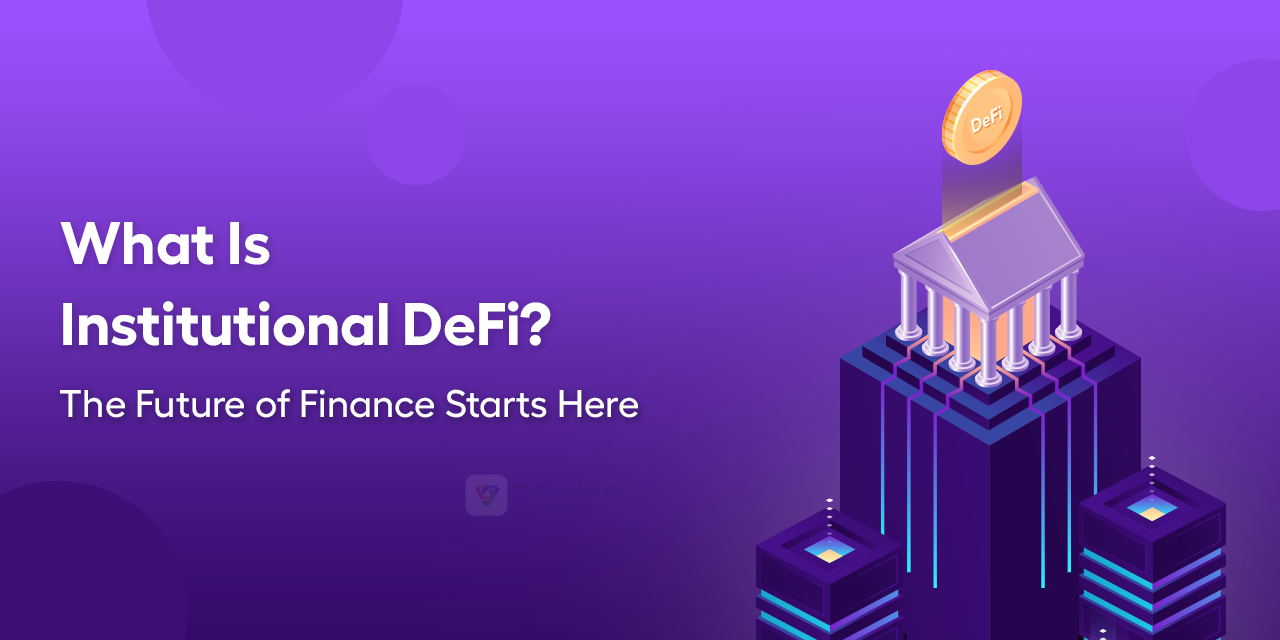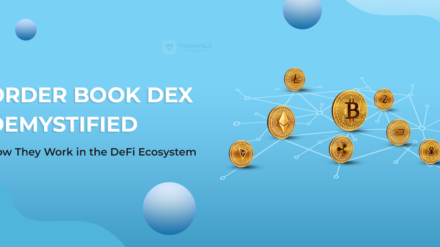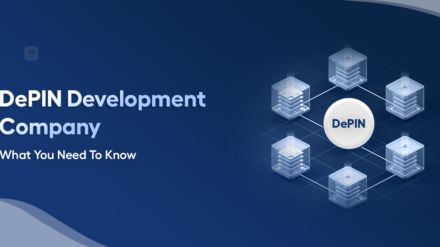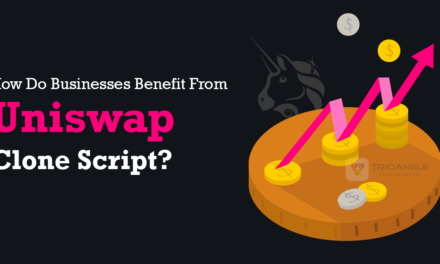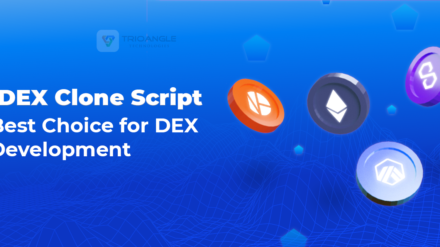If you’re a DeFi user, then you have read many blogs saying DeFi is “booming”, “evolving”, and “growing at the speed of light,” and more. The primary goal of decentralized finance is to provide a better alternative to centralized platforms and eliminate intermediaries in transactions. But how would you react if I told you that centralized financial sectors were now getting inspired by DeFi and adopting its mechanisms? Yes, it’s happening, this is what we call “institutional DeFi.”
If the term “institutional DeFi” sounds new to you, don’t worry. This blog helps you understand them in simpler terms.
So, let’s get dive in.
What is Institutional DeFi?
An institutional DeFi is a revolutionary concept within decentralized finance, or DeFi. It’s especially tailored for large centralized financial institutions such as banks, investment firms, and asset managers.
We all know that DeFi can do many things; users can facilitate trading, token swapping, lending & borrowing, and more. It helps to make user transactions more efficient and transparent with smart contracts and blockchain technology. In institutional DeFi, these same technologies were implemented in our traditional financial systems.
This concept acts as a bridge between DeFi and TradFi. By incorporating these technologies, centralized institutions can offer faster and transparent transactions, similar to DeFi. But here, it’s equipped with specific rules and regulations.
Real-World Use Cases Of Institutional DeFi
These decentralized financial innovations aren’t just an idea or future concept; they’re now implemented and making waves in the real-world financial sector. Let’s take a look at some of its use cases now.
1. Tokenized Bonds and Securities
Large corporations and governments often issue bonds, which allow investors to buy and earn interest. In our traditional finance, it typically takes time to buy or trade these bonds. Additionally, this process is filled with various brokers and tons of paperwork.
But with DeFi, these bonds can be converted into tokenized assets and stored on the blockchain network. This benefits them with:
- Instant transaction settlement.
- Requiring minimal operational costs.
- Global accessibility without the involvement of brokers.
Example: In 2021, the European Investment Bank (EIB) issued a €100 million digital bond on the Ethereum blockchain, assisted by Goldman Sachs, Santander, and Société Générale. It’s one of the real-world examples.
2. Cross-Border Payments and Treasury Management
Most large companies send money across countries for business purposes. This process usually takes up to 3 or more days to be finished, and this involves currency conversion, multiple banks, and settlement days.
Now, with the power of institutional DeFi, cross-border transactions can be done in seconds. This is possible with the help of smart contracts and blockchain technology. Moreover, this helps treasuries to manage their assets more efficiently.
Example: JP Morgan established a platform called Onyx. This solution utilizes JPM Coin to send money instantly between institutions.
3. Decentralized Lending Between Financial Institutions
Banks often lend their money to balance their cash flow; this process might be complex or take more time in our traditional banking systems.
But with DeFi, lending can be easier, risk-controlled, and faster. The smart contracts in the DeFi protocols handle real-time interest rates and key operations automatically.
This benefits in:
- Clear and visible loan process.
- Loans can be processed instantly without delays.
- Reduces counterparty risks through pre-written codes.
Example: Aave Arc is a special version of a lending and borrowing platform. This solution allows users to use loans only after the KYC checks.
4. Tokenized Real Estate or Investment Shares
Investing in real estate, art, and other physical properties requires a larger amount and usually takes more time to complete the investment process.
The Institutional DeFi streamlines this investment process. This lets users convert their physical assets, such as real estate, into tokenized assets. With this, these assets can be split into smaller digital pieces called “tokens.” The tokens can be traded, sold, or used as collateral in the markets. This approach makes investments more accessible for all small investors.
For example, SBI DAH (SBI Digital Asset Holdings) is a subsidiary of SBI Holdings. They are now digitizing traditional assets like bonds and private equity into secure tokens, using regulated platforms like OSL and SIX Digital Exchange. This makes trading simpler and fully compliant for institutional investors.
5. Avoids Accidental Bank Transfers
In 2021, Citibank accidentally transferred $900 million to Revlon’s lenders. Actually, the bank needs to send the interest amount alone, but as a manual error, they have sent the entire principal amount.
These situations happen rarely in our traditional financial system, mainly because of manual mistakes. However, the institutional DeFi can help them avoid these kinds of issues.
If these transactions happened with institutional DeFi, the smart contracts and other simple safeguards could’ve been in place to avoid the whole mess. Here’s what they are.
- Pre-set limit for transfers.
- Multi-party approvals for large transactions.
- Time delays for huge amounts of transfers.
- Real-time verification of errors.
The Institutional DeFi helps traditional financial institutions avoid huge mistakes and run more efficiently.
6. On-Chain Compliance and Identity Verification
If an individual wishes to use our traditional finance, they need to verify their KYC and other documents to proceed. This process might help institutions to avoid fraud and improve reliability. However, this is slow, repetitive, and costly to handle.
In this scenario, institutional DeFi utilizes immutable blockchain technology and lets users create a verified digital identity. Once created, individuals can use this as proof on any platform. They don’t need to verify it frequently. This revolution enables faster and cost-effective processes.
Ho, everything is good. “Are there any risks that exist in institutional DeFi?”
Yes, let’s explore what they are.
Risks Of Institutional DeFi
Institutional DeFi isn’t entirely perfect. To be real, it’s still in experimental phase. Here are some main challenges:
- Regulatory Risks – Most countries won’t have any rules of DeFi yet.
- Old Systems – Many institutions still use outdated technologies, which makes it hard to connect with blockchain technology.
- Data Privacy – Public blockchains might show transactions to everyone. This will not be suitable for all situations.
- Smart Contract Errors – Sometimes, some flaws can be seen in smart contract code, which makes it easier for hackers to break the system.
Because of these issues, institutions are testing these on private or hybrid blockchain networks. By doing so, they can keep some data private while leveraging the benefits of DeFi technology.
Why Institutional DeFi Deserves Your Attention?
If you have the idea of creating a venture in the blockchain space, or you were working in the fintech space. Or, if you are planning to invest for the long term, then you need to understand institutional DeFi.
This revolution won’t replace our traditional finance, but it gives a better and efficient infrastructure for them. This technology significantly influences…
- How loans are issued to individuals
- How retirement funds grow
- How governments manage debt
- And, how individuals can save, invest, and transfer assets or money.
Right. I hope you have now understood about “ What is Institutional DeFi” and its purposes. If you want more information about this topic, kindly SUBSCRIBE to our DeFi blog and be the first to get the latest insights, updates, and expert takes delivered straight to your inbox.
Wrapping Up
Institutional DeFi isn’t just an idea; it’s the next chapter of global finance. With the combination of smart contracts, blockchain technology, and traditional rules, this upgrades our financial system and helps to run it effectively.
Institutional DeFi shows how DeFi is becoming an essential thing for today’s financial sectors. Moreover, this creates an opportunity to build a future-proof business with the DeFi ecosystem.
If you want to establish a business in the DeFi sector or have a plan, then you must partner with a DeFi development company like Trioangle. As an industry-recognized firm, we are skilled in creating blockchain-equipped decentralized finance software solutions for your future ventures.
Got a DeFi Project Idea?

